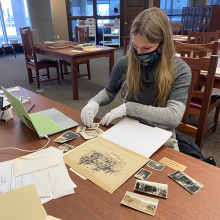Graduating senior, Kellyn Toombs arrived at CWRU with a mission to succeed at building a career in museum studies. “A big reason why I chose CWRU is its proximity to so many amazing museums, so I have been keeping my eyes peeled for volunteer, internship, and job opportunities in these museums throughout my four years here,” said Toombs.
Toombs has taken advantage of three signature programs at Case Western Reserve: Career Connections, Humanities@Work Microinternship and Practicum. From the perspective of the Career Center, Toombs' experience represents the "trifecta" of experiential learning.
We recently connected with Toombs to learn how she secured multiple experiential learning opportunities during her undergraduate years:
How did you begin getting involved in experiential learning at CWRU?
As a new student, I learned about the Career Connections program. From my participation there, I was able to shadow at the Indiana Historical Society, where I even got to serve as a judge for an event during National History Day.
Then In spring, 2021, I secured funding through a Humanities@Work microinternship [joint collaboration between the Career Center and the Baker Nord Center for Humanities] at the Cozad Bates House in University Circle. During the microinternship, I compiled a list of pre-existing online materials that the Cozad-Bates House staff can give to educators who want to help their students learn more about slavery, the underground railroad, abolitionism, and the 13th, 14th, and 15th amendments.
How did you go about finding additional opportunities?
Flash forward to spring 2022 semester, I landed a practicum at Cummings Center for the History of Psychology. The impetus for this experience originated from three weeks spent at the Glore Psychiatric Museum in St. Joseph, Missouri, during my sophomore year. When the museum's director heard I went to school in Cleveland, she immediately perked up and asked me if I'd been to the National Museum of Psychology (which is part of the larger Cummings Center for the History of Psychology). I was excited to hear that there was a museum that touched on psychiatric history in Northeast Ohio, and I made a mental note that I'd visit if I ever went to Akron. Plus, I kept it at the forefront of my mind for future experiential learning.
Given my love of psychiatric history and the museums that preserve it, I pursued the Cummings Center for the History of Psychology. I was so lucky that the Cummings Center director was willing to share my email with the rest of the staff, because the assistant director realized that January, 2022, would be the perfect time to have an intern to help develop a new exhibit on the psychology of "home." During my practicum experience, I spent a lot of time searching through the archives and collections to find artifacts, documents, or other materials that could be relevant to the psychological aspects that make a place feel like a home. This was my first time digging through a collection to find artifacts and documents for an exhibit. I learned a lot about using museum data bases and archival finding aids to help locate relevant materials. Part of this process also involves physically locating the items and handling them up close to see what they are and what we can learn from them, so I have gained a lot of experience in (gently) handling photographs and papers that are sometimes over 100 years old.
What advice would you give to students seeking opportunities to improve their chances of success?
So far, I have volunteered, interned, or worked in seven different museums. I found three of these opportunities by going to the museum's website, finding the contact information for the director or volunteer coordinator, and sending them an email that explained why I was interested in the museum and asking if there were any volunteer or job opportunities available. The staff at the organization you want to work for won't always be able to offer you a paying job or an internship, but you might be surprised at the mentorship that the staff are willing to offer to students who are interested in their work, and there are funding streams around CWRU that can often support your interests.
If you can't find a long-term internship or a paid job in the field you want to work in, remember to look for volunteer positions as well (while volunteering may not be an option in all fields, don't overlook it if you are pre-med or interested in working for non-profit organizations like museums) Volunteering will still provide you with new skills and work experience that you can add to your resume, even if you can only spare time on the weekends.
What are your plans for the future and how will this opportunity impact those plans?
My career goal has always been to work in a museum, so I am so grateful that I've had so many opportunities to make me a competitive applicant for other museum jobs I will pursue in the future. I will be starting my master's degree in museum studies at The University of the Arts in Philadelphia this fall, and I am so excited to see what museum opportunities this program and the city of Philadelphia will offer!


